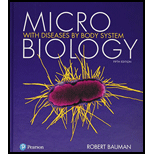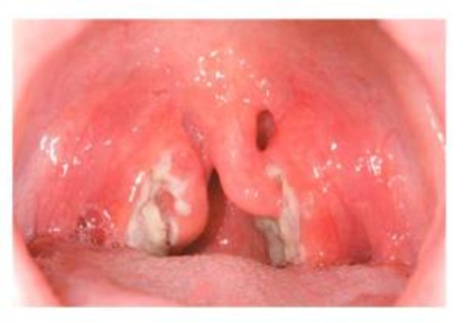
The Big Game

College sophomore Nadia is a star point guard for her school’s basketball team. She is excited about the divisional finals Friday night-she’s even heard rumors that a professional scout will be in the stands. On Thursday morning, she wakes up with a sore throa1. Her forehead doesn’t feel warm, so she forces herself to attend her Thursday classes; but when she wakes up on Friday morning, her throat is noticeably worse. Still, she forces herself to attend Friday morning class but feels tired and much worse by noon. It is downright painful to swallow, and she skips lunch.
Nearly crying, she heads back to the dorm and checks her temperature—101°F. Desperate, she walks to the student health center, where a nurse practitioner notices white spots on the back of Nadia's throat and on her tonsils. The divisional basketball game starts in six hours, but it only takes a few minutes for the nurse practitioner to perform a rapid streptococcal antigen test and determine that Nadia has streptococcal pharyngitis—strep throat. She will miss the big game.
Strep throat is caused by an encapsulated, Gram-positive bacterium, Streptococcus pyogenes. The only good news is that by taking the prescribed penicillin, Nadia should be ready for her next big game-hopefully, the quarterfinals.
- 1. How does the capsule of Streptococcus contribute to the bacterium's ability to cause disease?
- 2. What bacterial structures, besides the capsule, may be allowing Streptococcus to infect Nadia’s throat?
- 3. Penicillin works by interrupting the formation of peptidoglycan. What bacterial structure contains peptidoglycan? In a Gram-positive organism such as Streptococcus, is this structure typically thicker or thinner than ii would be in a Gram-negative bacterium?
Want to see the full answer?
Check out a sample textbook solution
Chapter 3 Solutions
Pearson eText Bauman Microbiology with Diseases by Body Systems -- Instant Access (Pearson+)
- 18. Watch this short youtube video about SARS CoV-2 replication. SARS-CoV-2 Life Cycle (Summer 2020) - YouTube.19. What is the name of the receptor that SARS CoV-2 uses to enter cells? Which human cells express this receptor? 20. Name a few of the proteins that the SARS CoV-2 mRNA codes for. 21. What is the role of the golgi apparatus related to SARS CoV-2arrow_forwardState the five functions of Globular Proteins, and give an example of a protein for each function.arrow_forwardDiagram of check cell under low power and high powerarrow_forward
- a couple in which the father has the a blood type and the mother has the o blood type produce an offspring with the o blood type, how does this happen? how could two functionally O parents produce an offspring that has the a blood type?arrow_forwardWhat is the opening indicated by the pointer? (leaf x.s.) stomate guard cell lenticel intercellular space none of thesearrow_forwardIdentify the indicated tissue? (stem x.s.) parenchyma collenchyma sclerenchyma ○ xylem ○ phloem none of thesearrow_forward
- Where did this structure originate from? (Salix branch root) epidermis cortex endodermis pericycle vascular cylinderarrow_forwardIdentify the indicated tissue. (Tilia stem x.s.) parenchyma collenchyma sclerenchyma xylem phloem none of thesearrow_forwardIdentify the indicated structure. (Cucurbita stem l.s.) pit lenticel stomate tendril none of thesearrow_forward
- Identify the specific cell? (Zebrina leaf peel) vessel element sieve element companion cell tracheid guard cell subsidiary cell none of thesearrow_forwardWhat type of cells flank the opening on either side? (leaf x.s.) vessel elements sieve elements companion cells tracheids guard cells none of thesearrow_forwardWhat specific cell is indicated. (Cucurbita stem I.s.) vessel element sieve element O companion cell tracheid guard cell none of thesearrow_forward
 Human Biology (MindTap Course List)BiologyISBN:9781305112100Author:Cecie Starr, Beverly McMillanPublisher:Cengage Learning
Human Biology (MindTap Course List)BiologyISBN:9781305112100Author:Cecie Starr, Beverly McMillanPublisher:Cengage Learning Human Physiology: From Cells to Systems (MindTap ...BiologyISBN:9781285866932Author:Lauralee SherwoodPublisher:Cengage LearningUnderstanding Health Insurance: A Guide to Billin...Health & NutritionISBN:9781337679480Author:GREENPublisher:Cengage
Human Physiology: From Cells to Systems (MindTap ...BiologyISBN:9781285866932Author:Lauralee SherwoodPublisher:Cengage LearningUnderstanding Health Insurance: A Guide to Billin...Health & NutritionISBN:9781337679480Author:GREENPublisher:Cengage





